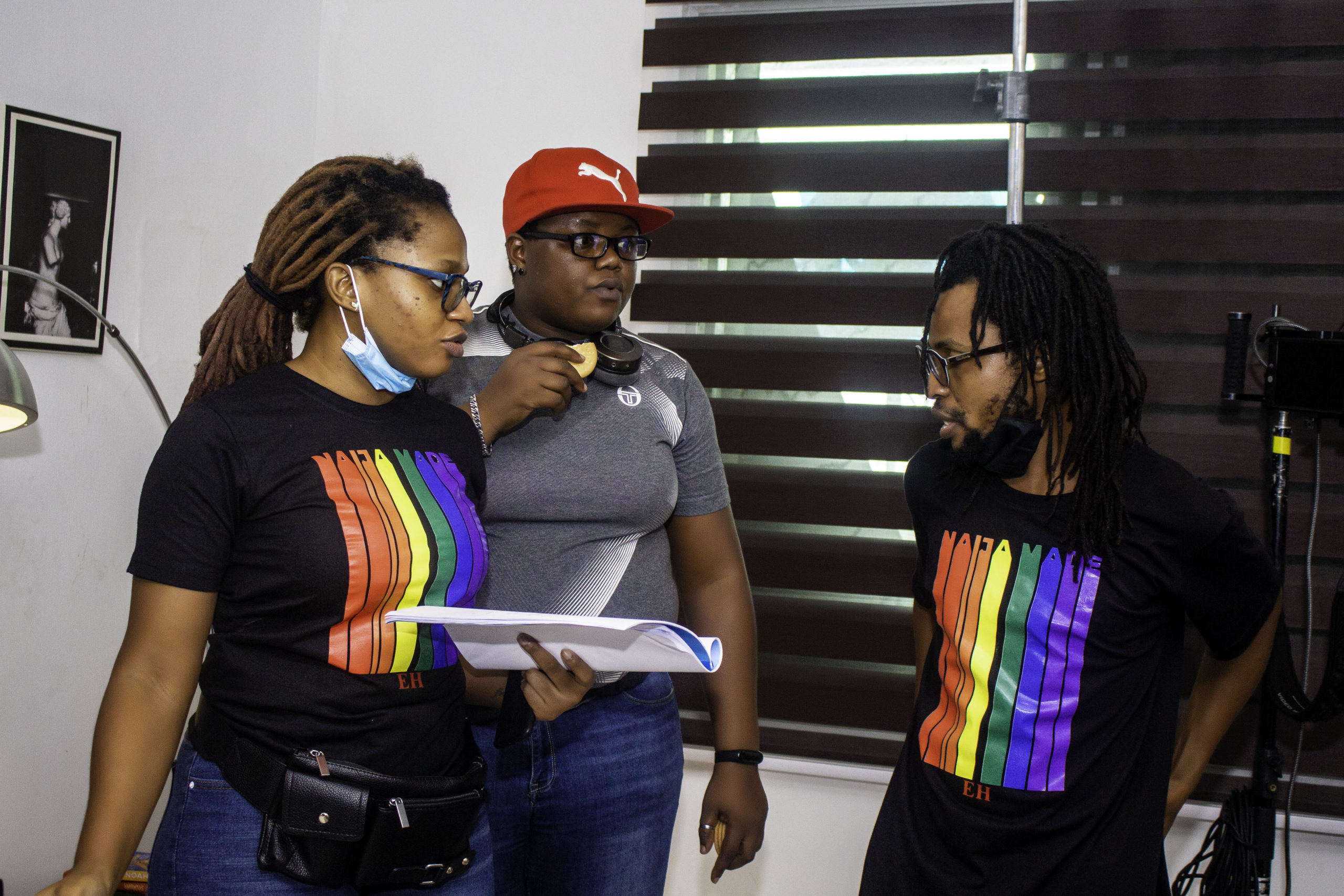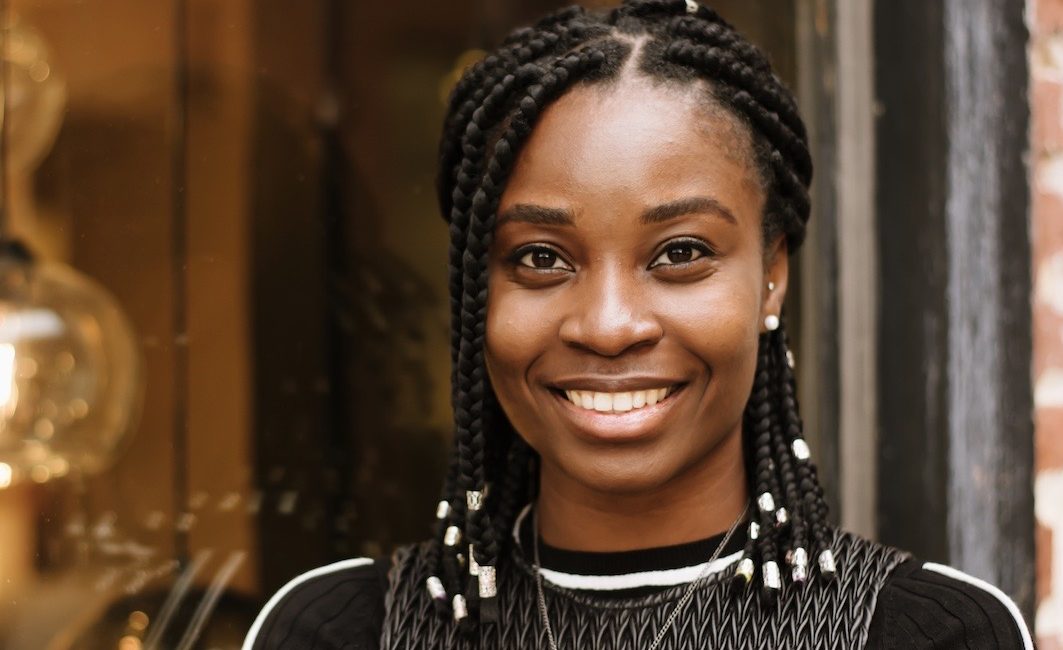Lagos, Nigeria (Minority Africa) — Pamela Adie is not new to the struggle of ensuring proper representation of queer people and social acceptance. Pending in the Nigerian court of appeal is a suit that challenges the Corporate Affairs Commission’s refusal to register Lesbian Equality and Empowerment Initiative (LEEI), an NGO she set up for lesbians in Nigeria.
Today, Adie, 36, remains an LGBTQ+ rights activist and is the executive director of Equality Hub.
She has worked on several groundbreaking projects in the past including her biographical documentary, Under The Rainbow which screened at the residence of the British Deputy High Commission in Lagos, Nigeria and has just recently produced a short film, Ìfẹ̀, that follows the story of two women who fall in love over a three-day date.
“Representation in films is key in terms of accelerating social acceptance for the LGBT community,” Adie tells Minority Africa. “If you look at history, what you see is that when they portray us, we are portrayed as people to be ridiculed or people to sometimes be killed… the stories are usually negative, we rarely find positive stories.”
Ìfẹ̀ is directed by Uyaiedu Ikpe-Etim, 31, a Radio, Television, and Film Studies graduate of Eastern Mediterranean University in North Cyprus.
Ikpe-Etim was the best graduating student in her class and with Ìfẹ̀ as her directorial debut, she explains that she wants to challenge the ugly norms of homophobia that have become ingrained in Nollywood over time.
“Stories can be used to paint a group of people however you want to paint them,” she says. “What I did in Ìfẹ̀ is to paint LGBT people in a different light, representing queer people as normal people who are here and live normal lives like everyone else.’’
Ìfẹ̀ would not be the first film to address queer representation in Nigeria. It is coming after Hell or High Water, a movie about a gay pastor who eventually accepts his sexuality amidst stiff opposition from the public, but Ìfẹ̀ would nonetheless be the first Nigerian film to center women who are lesbian or bisexual.
“This story needs to be told also because as a lesbian or bisexual woman, you are doubly silenced, first as a woman and second as queer,” Adie says.

“It is not an unusual story; it is just a story of an underrepresented and misrepresented subject in Nollywood,’’ Uzoamaka Aniunoh, one of the two-cast members, tells Minority Africa.
Aniunoh holds a Master’s Degree in Creative Writing from the University of Birmingham and has appeared in the Pan-African TV series, MTV Shuga. She hopes Nigerians question the prevalent homophobic sentiments.
“When people watch, I expect that they will question why they feel the things that they feel and why they are against something so beautiful and human,’’ Aniunoh says.
Despite the seminal place Ìfẹ̀ will hold in Nollywood, its creators will not allow it to be termed a “queer’’ movie. Recognizing the power of language to redefine people’s experiences and confine to a tag, Ikpe-Etim opines, “Queer is not a genre.”
The ultimate goal of the team behind Ìfẹ̀ is not to create a separate space for movies that portray queer people’s experience but to make the inclusion of queer people seamless and a part of the system.
“When you watch a movie with heterosexual people, do you call it a heterosexual movie?” Aniunoh asks. “When you watch a movie, for example, and the characters do not engage in sex, do you say, ‘Oh, this is an asexual film?’’’

Yet for all its norm-breaking, Ìfẹ̀ would not be aired on Nigerian television. It would only be available on select channels provided by the Equality Hub. Its creators deem it a movie for those who need it and who want to watch themselves represented on-screen with accurate depictions that do not make queer people props.
They describe it as not geared towards the consumerism of the Nigerian movie industry and instead as a work of passion put together by a group of people who are tired of being on the sidelines, and of leaving their identity and its interpretation in the hands of outsiders who do not fully understand them or are willfully bound to a pact of non-acceptance of their humanity.
On this note, Aniunoh remarks, “From the beginning of time, we have watched heterosexual love on TV; this is reminiscent of when we didn’t see black people on TV. Now there are queer people around and we are here to show queer love.’’

The landscape of identities, however, remains narrow; and Ìfẹ̀, its creators know, will bolster queer representation in Nigeria at a cost.
The Director of the National Film and Video Censors Board in Nigeria has criticized the movie, promising to “track down those involved in it” because “the laws of the land prohibits certain things,” but Adie says they had no intention of taking the film to the board in the first place.
When asked how she feels about her directorial debut not being aired in every Nigerian household or being watched in cinemas across the country, Ikpe-Etim says, “What I am focused on is the joy the movie is going to bring to the LGBT community in Nigeria, not the public perception of a lesbian love-themed movie or any possible backlash.’’
Adie, on the other hand, is partly motivated that visibility will reduce homophobic norms in Nigeria because of the dropping statistic of the non-acceptance rate of queer people in Nigeria.
A 2019 Social Perception Survey on LGBTQ+ Rights in Nigeria showed a gradual increase in acceptance of LGBTQ+ persons. The results revealed that 60% of Nigerians will not accept a family member who is LGBTQ+, significant progress from the 83% who said they would not in 2017.
According to Adie, “The lack of stories like this gives the impression that we do not exist in Nigeria.”
Nigeria’s Same-Sex Marriage Prohibition Act prohibits marriage between persons of the same sex and organizations comprising gay people in Nigeria. There are however no laws criminalizing making films with gay characters.
“This [movie] is not about same-sex marriage or what they call gay organization,” Adie says. “The law does not criminalize being an LGBT person. Another thing is that the law does not criminalize making films about queer people.”

As one of the two actors in the movie, Aniunoh remains undaunted in the face of possible scrutiny.
“I am okay with being under the scrutiny… I am okay with being judged. This story is something that needs to be said, [homophobia] is something that needs to be tackled.’’
Ìfẹ̀ is among the first of the many required steps towards a proper representation of queer people in Nollywood and its creators know this.
“Queer lives have been intellectualized that you don’t even see lower-class people in Nigeria who are queer,” Ikpe-Etim says. “We need ordinary queer people to feature more and as filmmakers, we should do more on that.”
“When conversations about queer people come up, people only think about them sexually and this is a notion that must be changed.’’
For all the challenges in its path, Ìfẹ̀ will go a long way to staking a claim for LGBTQ+ persons in Nollywood.
“I don’t think Nollywood was conceived with us in mind because we have been waiting for mainstream Nollywood to make a film about us and that has not happened yet,” Adie tells Minority Africa. “We need access to resources and connection to tell these stories ourselves.”
Aniunoh, convinced of both the struggles and the symbolic importance of movies like Ìfẹ̀, paints a vivid analogy of the situation:
“When you are not invited to a table, you bring your own chair and if you are not allowed to sit at the table, you build your own table and invite your people.”
The teaser for Ìfẹ̀ is live on the 15th of July. To watch this and keep up with updates on the movie, visit its dedicated website.



